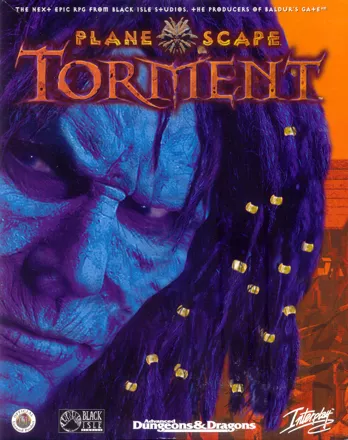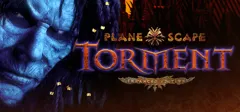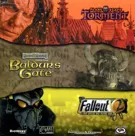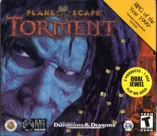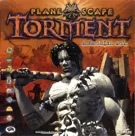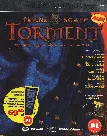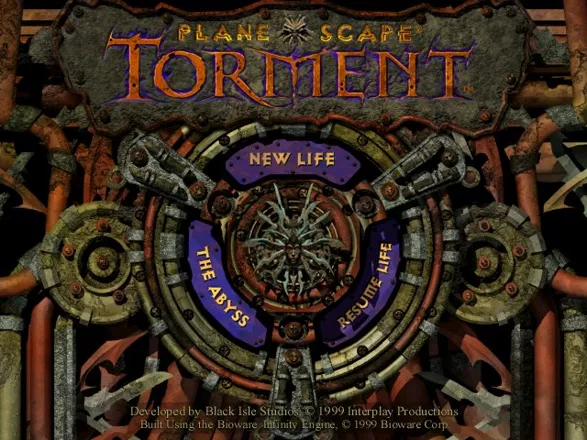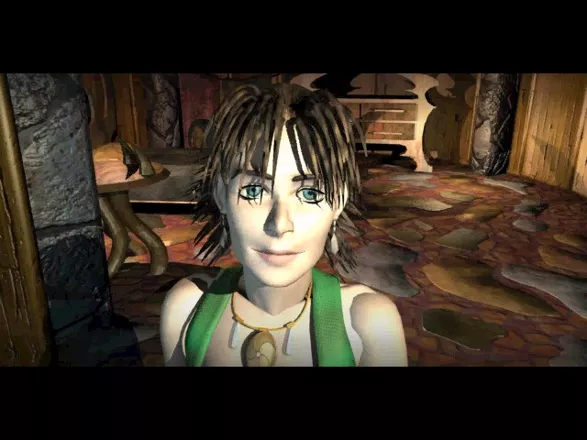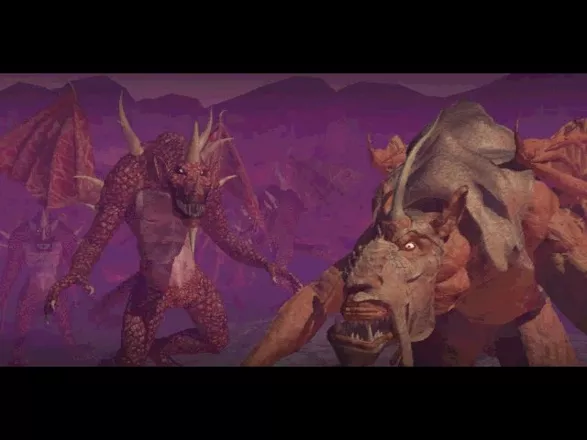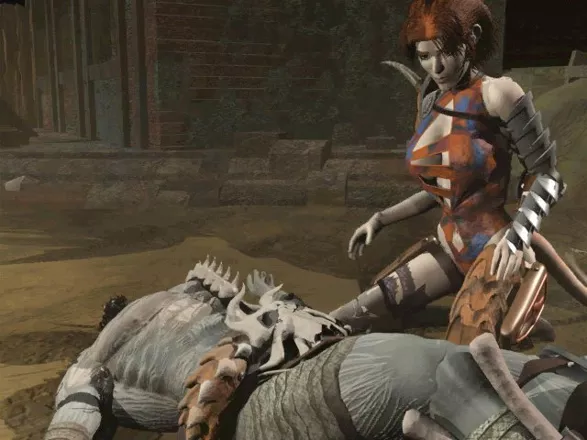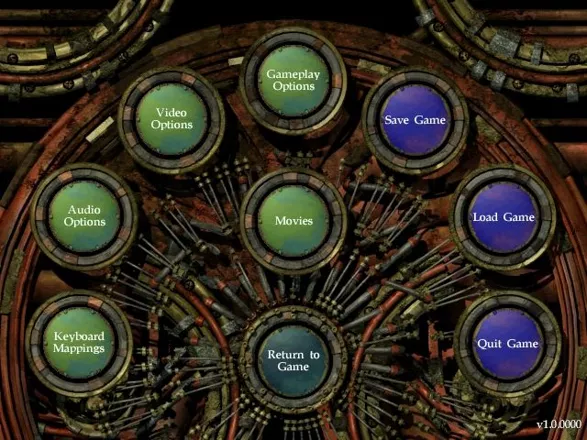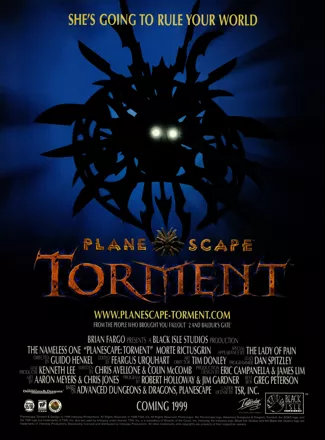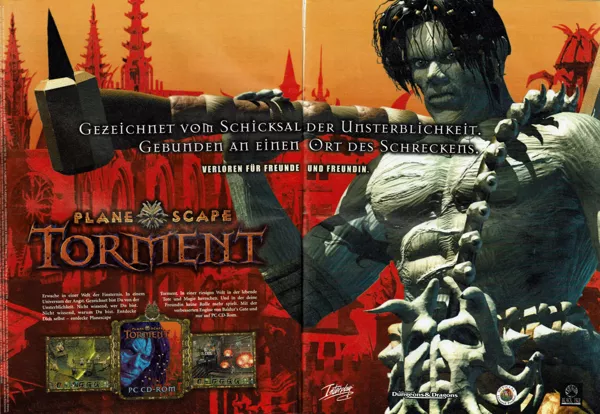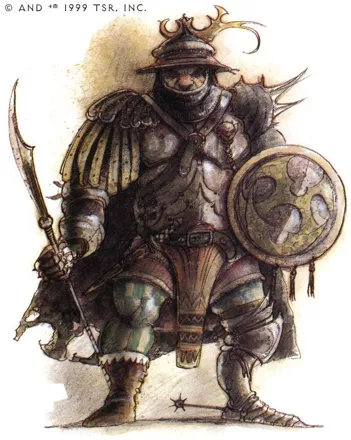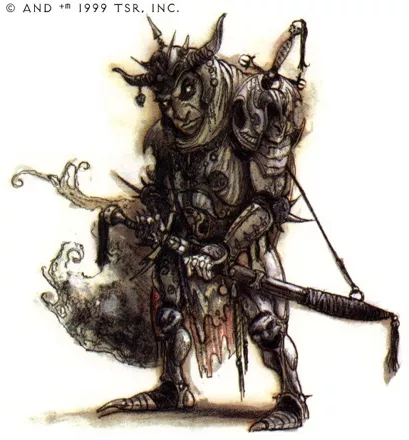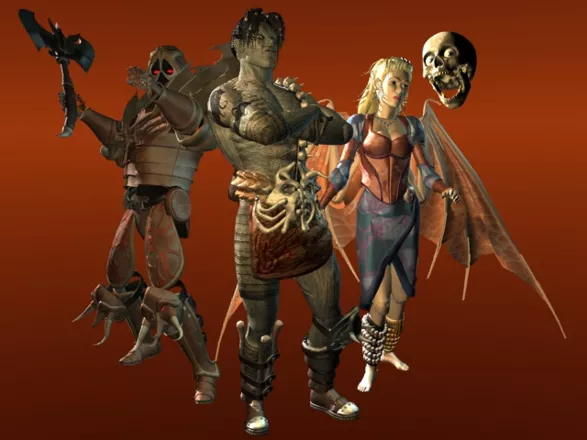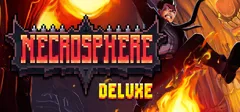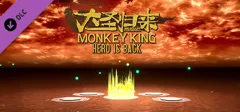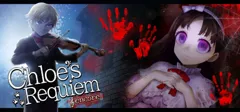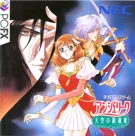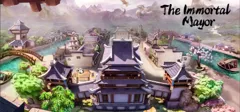Planescape: Torment
Description official descriptions
Waking up on a stone slab in a morgue, which the zombie workers just pushed into the room, a big man with a face deformed by scars, his back marked by strange tattoos, looks at the dead bodies scattered around the room through the dim light, unable to understand who he is. He is sure that he is dead, yet he is also sure that he moves, thinks, and feels. Memories of love, a woman's face, good and bad deeds of his life - all his past appears in a flash, only to be replaced by the dreadful reality of the mortuary.
His journey begins with only one goal: he must learn his name, find out what had happened to him, and which forces prevent him from dying in peace, like all other human beings. The Nameless One opens the doors of the mortuary, only to dive into a world full of fateful encounters, strange characters, broken hopes, despair, and hatred. Piece by piece he shall solve the puzzle and re-discover his own past.
Planescape: Torment is a role-playing game that uses a heavily altered variation of the Advanced Dungeons & Dragons Second Edition rules. It is set in the Planescape, the exotic AD&D setting which is composed out of various "planes" of existence, with unique characteristics to each. The game features the party-based, "real-time-with-pause" combat system which was previously employed in Baldur's Gate.
Character growth is handled via the standard AD&D attributes, which can be raised and modified in the game. Abilities that are not exclusive to combat, such as Intelligence, Wisdom, and Charisma, play a special role in the development and outcome of many of the game's conversations and quests. Dialogue options may become available only if the corresponding character parameter is sufficiently high. The outcome of the final quest and thus the ending of the entire game also depend on the way the player has been shaping The Nameless One during the journey.
Various fairly exotic characters - including a talking floating skull and a winged succubus who runs a "spiritual" brothel - will join the hero on his quest. These characters belong to the traditional AD&D classes of fighter, mage, thief, and cleric. The Nameless One himself starts as a fighter but is able to become a mage or a thief if he meets certain requirements and completes certain quests. The hero is unable to wear armor but can enhance his defenses with special tattoos.
Though combat occupies a significant portion of the game, much of it is dedicated to acquiring experience through exploration of the Sigil, the game's main "hub" town, and performing quests for its inhabitants. The game is notable for containing a very large amount of in-game text and conversation.
Spellings
- 异域镇魂曲 - Simplified Chinese spelling
- 異域鎮魂曲 - Traditional Chinese spelling
Groups +
- Dungeons & Dragons (D&D / AD&D) licensees
- Fantasy creatures: Succubi or incubi
- Game Engine: Infinity Engine
- Gameplay feature: Character development - Skill distribution
- Gameplay feature: Journal
- Gameplay feature: Pickpocketing
- Games made into books
- Physical Bonus Content: Poster
- Theme: Amnesia
- Torment series
- White Label releases
Screenshots
Promos
Videos
Add Trailer or Gameplay Video +1 point
See any errors or missing info for this game?
You can submit a correction, contribute trivia, add to a game group, add a related site or alternate title.
Credits (Windows version)
143 People (137 developers, 6 thanks) · View all
| Lead Programmer | |
| Programmers | |
| Additional Programming | |
| Scripters | |
| Movie Technology | |
| Lead Artist | |
| Artists | |
| Additional Art | |
| Lead Designer | |
| Designers | |
| [ full credits ] | |
Reviews
Critics
Average score: 89% (based on 61 ratings)
Players
Average score: 4.2 out of 5 (based on 372 ratings with 20 reviews)
The Good
After having produced the brilliant Fallout 2, Black Isle moved onto a more personal project helmed by Chris Avellone. Building upon good old AD&D rules and a smooth new engine provided by Baldur's Gate, they have created one of the most memorable role-playing games in history, evoking passionate feedback from the community.
Planescape: Torment goes to great lengths caring for the artistic, creative side of video game design (style, setting, writing, etc.). At the same time, it never forgets it is a game. It's certainly "artsy", it screams originality, but - as opposed to too many other games with similar premises - it is a fantastic role-playing game, regardless of its other aspirations. If it were just a generic "kill the bad guy" story set in a generic fantasy world, it would still be an enjoyable, high-quality RPG.
The role-playing system of the game is rich and detailed. You shape your character the way you like. The choices go much deeper than simply selecting a dialogue option; they are integrated into the gameplay and the storyline in such a way that every encounter will make you think about your behavior. It's not just a matter of being nice or rude, killing people or helping them; there is ambiguity in almost every action you take, in the way you are slowly discovering your true identity.
As you play the game, you are constantly facing the questions: what kind of a person have you been? What kind of a person are you now? And more concretely, how should you play the game so that your actions will finally reveal to you the protagonist's true nature?.. This is pure magic - very few games have managed to create this kind of emotional attachment to the protagonist without compromising the flexibility of character development or diminishing the player's control over it.
On a technical level, all those choices appear in a form of quests and refined character customization. There is a large amount of optional quests in the game; many of them can be solved in various ways. Almost every character has something to share with you; almost everywhere you can find interesting tasks. The game world may not be huge, but it surely takes time to explore, and instead of empty places with uninteresting people that appear in so many games, you'll find more and more fascinating layers of the game's world.
Character customization affects the gameplay and the plot much more than in traditional AD&D games. We are all used that extra points invested in strength will make you hit the enemies harder, that constitution gives you more hit points, that a mage should have high intelligence, etc. But here, the attributes are important not only for defining classes or aiding you in combat; they have a direct influence on dialogue lines, quest solutions, and ultimately the entire storyline. Upgrading your character when leveling up will not only make him stronger or quicker; it will change him as a whole, the way he interacts with people, the way he thinks and feels. There are several different endings in the game, and they don't only depend on some choices you make at the last moment, but on the way you've been shaping your character all along.
Battles in the game are handled the same way as in Baldur's Gate. The game is much less combat-oriented, and the sporadic skirmishes you participate in are almost exclusively confined to narrow areas. Still, even with these restrictions, the battles are pleasant and can get reasonably challenging on higher difficulty levels. While your companions are rather predictable gameplay-wise, the main protagonist can be shaped in several interesting ways, his magical route being particularly fulfilling.
The game has an absolutely unique style that is impossible to imitate. The world of Planescape: Torment is its world only, period. You won't find anything like this in any other game. Somehow, it fits into a medieval fantasy setting - but you won't find any kings, castles, brave knights, or beautiful princesses. Instead, you'll encounter a zombie-infested morgue, slums in a depressingly dark city, streets full of suspicious thieves, girls with wings or tails, people eternally tormented in fire, strange ancient creatures, magical realm hidden in a cube, and much more. Weapons, inventory items, characters, locations, monsters - everything bears the stamp of the game's incredible personality, as if it were created especially for it.
You'll encounter fascinating characters on your way, and assemble a party that surpasses the best examples of Japanese RPGs in style and characterization. Your companions have layers upon layers of personality, long and complex dialogue trees for you to explore, secrets to discover. And probably the most bizarre and fascinating character is the protagonist himself, The Nameless One, a scarred dead body that gets to live over and over again, no matter how many times he dies; a being without a memory, but with something that torments his mind.
The game has a huge amount of conversations, yet all of them are brilliantly written; it's a joy to climb deeper and deeper into the intricate web of dialogues, exploring more and more of them, seeing how they differ depending on what you have made your character into, uncovering more and more information and secrets. Unlike so many other games, the main storyline here doesn't involve saving the world and defeating the big bad guy. No, what you have to do in this game is find out who you are. And although there will be plenty of hostile creatures on your way, you won't be just killing them on your way to the final boss; you won't be collecting some magical items needed to defeat the great evil; but you'll discover, step by step, your true identity, your true purpose in this world.
The Bad
Even though I love Planescape: Torment, I cannot overlook its limitations as a role-playing game. First of all, it's not very big. Granted, almost every screen you visit is bursting with quality; but the game does not convey the sensation of exploration and traveling as well as some of the more conventionally-minded representatives of its genre. I understand that not every RPG must have an open world; but I was left craving for more locations when I finished the game. It is particularly noticeable during the final part, where you are whisked from one small area to another in an utterly linear fashion, struggling to find a sense of control as you begin to feel it's being taken away from you.
It seems that the creators of Planescape: Torment had a particular fondness for the adventure genre. Much of the game is dedicated to laid-back trips through busy, yet non-threatening locations, and communication with NPCs is noticeably more prominent than combat. I wouldn't mind that at all if the few mandatory hostile areas were more rewarding from the point of view of character development. However, performing side quests yields significantly more experience than fighting, thus diminishing our motivation for seeking out enemies and dealing with them.
The Bottom Line
Planescape: Torment embodies all the fine qualities of an intellectually stimulating, artistic RPG, beautifully entwining is creative content with refined, rich gameplay. Not everyone will enjoy its text-heavy nature and its relatively modest size; but, like the best works of chamber music, it substitutes quantity for quality with resounding success.
Windows · by Unicorn Lynx (181780) · 2014
The best game I have ever played to date.
The Good
Sometimes games can transcend the medium and rise above the level of a pastime relegated to spotty teenagers. This is one of those times.
I am not one to award the title "great" to anything, and only on a few occasions before now have I declared anything the "best" of its type.
But this is the best game I have ever played to date. If this game's contemporary, Ultima 9: Ascension, tells future designers how to make an engrossing 3D world simulation, this game tells designs how to craft a story that is best suited to the medium.
For one, unlike many games of the genre the characters that can adventure with you are crafted -with- the story, not written in to function as pack-mules or combat satellites. When something happens in the game, chances are one of your companions has something to say about it ranging from helpful advice to wry commentary on the unfolding situation. Your companions will continue to play a role in the story even after they have joined the party, quite rare for a game of this type. It works so well it makes me wonder why it isn't done more often.
This is the only game I have seen to this day that differentiates between a honest-to-god threat and bluff, and vow between a lie. Not only to words have meaning, so do the meaning behind those words. On a similar note this game possesses some of the best written dialogue I have seen anywhere, not since Ultima 7 has even the most inconsequential character been so well written.
Some AD&D purists might not like the fact that the game plays pretty fast and loose with the rules. Maybe they would be happier with Baldur's Gate, in my opinion the most overrated game in the last few years. In P:T the rules serve as a backdrop, not a backbone. In that way this game, though single-player only, feels more like a good pen&paper session with an experienced DM than any CRPG I have ever played.
The Bad
The manual is justifiably skimpy on details about the game setting and historical information. Considering your character plays an amnesiac it would be inappropriate to include a Planescape Campaign handbook with the game. However, the manual is absent of any information regarding the way the rules work, considering that the game is based on the AD&D ruleset this seems almost unforgivable. While the game is still playable without understanding what your THACO actually means, it does detract in minor ways from the playability.
The interface is a little clunky, though I did get used to it soon enough and it never really hindered gameplay.
In the unpatched version of the game there are a few minor dialogue bugs involving the improper resetting of conversation trees, but no plot stoppers to speak of. One technical issue that does deserve mention is that when the game has been running for more than a few errors most players experience a game-killing slowdown. Although there are a number of temporary fixes for the issue the only real way to get around it is by saving and restarting the computer. Annoying, but infrequent enough that it is only that, an annoyance. At the time of this writing there is no patch to correct this issue, but Black Isle Studios has promised that one is forthcoming.
The Bottom Line
An excellent adaptation of the TSR Planescape Multiverse and a wonderful example of how to tell a story with an interactive medium.
To speak too much of the story itself would be a crime, suffice to say that your character awakes on a slab in a Mortuary in a strange city with no memory to speak of. From there he embarks on a quest to discover himself and learns about the nature of man.
Windows · by Patrick Mills (36) · 2000
The Good
Never before have I stumbled upon any similar game to this one. This one is strong enough to define a new dimension of adventure and role-playing genre by itself, as it borders with so many similarities to as-we-know-them isometric hack & slash RPGs (by simply being played throughout such a viewport), and with royal 3rd-person point and click adventure genre (as it has more dialogues than in any pure adventure genre I know, more text that in some pure text-only adventure, too). So what's so special about this game in general and why is it worthy spending couple of months playing it (and that's bare minimum you'll need of your time), let's see...
You're playing a big, muscled character, who simply cannot remember his name. Awaking in the mortuary, on a slab pushed here by some mindless zombie drone, you find your only help to be a babbling skull, Morte's the name. For some strange reason you yet need to discover, you are immortal (at least in general), and your wounds heal very quickly. However, your body does look like you've pased through some serious series of battles and got skewered and hacked quite a lot. Yet another thing is making you a drawback in this game, your memory. You've seen to lost it. As a matter of fact, you seem to lost a part of it every time you die. So, that's all you find out from the story epilogue, but it gets more and more complicated as you progress, with a series of sub-stories aside as well.
A typical mark of an RPG is a character skill level upgrading system. Well, here you have all the needed, charisma, which improves your look and help you when talking to strangers, or at least they're more pleasant. Wisdom, which helps you regain your memory faster, and makes you smarter, or should I say, wiser, so you get more options in dialogues with everyone. Intelligence whih can be good if you decide to orient your character into a mage. Dexterity which comes in handy for thief's hands, raw strength for a warrior class, and so on. Or, you can try making a ballance of them all, and have good part of all, but none to be the best.
Dialogues are really enlarged and I bet the script for this game was at least twice the size of some encyclopedia, but the fact is that the text isn't just babbling in the wind, it actually makes sense, all of it (well, most of it), and is funny, sad, annoying, ordinarily, and basically resembles the situation of the game to fit it in its own style. Battle system is also nicely done, especially when you have to control all six of your characters, it work efficient, more or less. Dunno if it could be done any better (except for the speed). Music is very nice to listen in the background, but isn't the stronger side of the game, especially since it's rare and you won't remember hearing more than just a couple of different songs throughout the whole game, even though your music directory on your hard will tell you otherwise.
I dunno what's happening nowadays, either we're getting too much or horror games out there, or is the graphic just getting better? Anyway, I don't think some "Ghost 'n' Goblins" or "Castlevania" or even "Alone in the Dark" could scare anyone, but today's games, hehe, man, that works even too good. Must've been the graphic and the bigger power our machines can achieve. Well, the thing I mention these is not because this game's a horror, it's most certainly not! But comes to think of it, if all those things you'll encounter by playing this game, and all things that'll be described or heard in the dialogues would be done a bit better visually, or at all, "Phantasmagoria" would seem like a child's toy comparing to the level of yuckness this game could achieve. Why am I saying this under the 'good' section? Well, because you won't get a feeling you're in some gruesome place at all, hehe, it's all so well made to show such nonesense not a bit. It really sticks to story instead of the atmosphere, and they achieved that quite wonderful, I must say.
The Bad
So, is there anything bad about this game? Well of course there is, and no, don't just tell me "every game has bad things", because that doesn't have to be true in every case, and every player can count at least two games that have no flaws in his/her eyes.
I) All dialogues (99,99999% of them) is not done by voice-acting at all, which begs to ask, why employing such a known people for voice-acting when there's barely something you may hear. Only speech you hear is when you try to take someone's armour or a weapon off, or the first sentence in their dialogue with you. And yet, game is on 4CDs, but this really looks terrible. I mean, once you hear them talking, and next 100 paragraphs you must read yourself, and not to mention there are as many descriptive talks as actual parts of conversation. I mean, Sierra did make their "Phantasmagoria" in 16 colors only just because the FMV took 7CDs, but if they removed speech, they'd at least spare one more CD on that game, too.
II) Game that comes on 4CDs and barely has any animations and speech is doing something wrong. Even though game has so many paths you can finish it, play it, and do certain things in it, should fit on one or two CDs. And as much as it may seem big, it is not. That small map you see at the start is the entire territory of the game, and all those planes that are mentioned in the game are just a few you will be, and can be at. The game is smaller in places than "Revenant" or maybe even "Nox", which both come on a single CD only, and yet both of them have more animations than this one. Not to mention fully speech. And they're all made pretty at close distance to each other, so comparing can be allowed and fair.
III) This game is dragging its butt like a wild boar who was shot with a sleeping injection. It's so slow that it's intolerable. As soon as some magic is used, or more enemies comes to the screen, it almost looks as it'll crash. The fact that this game is released three years ago, and that I was playing it on 1GHz processor with 384MB of RAM is very bad to accept. I mean, back in 1999 even best computers weren't this strong, so for who did they make that game? Or maybe they made it be equally slow on 30GHz CPU or some old 486 just as well.
IV) The entire sound and music quantity in this game is terrible. Of course, this is all shadowed by the story, but it's terrible if you focus on that thing, only. Also, if you battle, and the music is fast and furious, and then you go talking to someone, you may end up talking for half an hour, while having same annoying fast attacking song in the background. Sometimes, my only choice is to switch to some radio station until I'm through reading some dialogue. Man, how would it only be if this game WOULD have speech ;)
V) The game is too filled with bugs, as if they rushed its release before some serious must-testing. Since game constantly fills its 'temp' directory with infos about all the rooms and places you were onto, it may slow down every now and then, and that happens rather too often to neglect. Or sometimes you may just end up wihtout seeing your mouse cursor or selection lines and windowses.
I could say a few more annoyances, but I could also say a few more good things about this game, and I'm bordered with the size of this post, so this should suffice as general pointer.
The Bottom Line
This is one of those games that manages to fascinate you with its creativity level to being unbelievably good. However, no matter how much you may like it, it also gives you an open view to all of its downfalls, so you can either choose to neglect them, and keep being angry inside yourself, or you can shift your opinion about this game all the time, going from "whow, what a treasure" to "ah crap, is there anything good about this game". The thing is, that no matter how deep this story may seem at first, second or ever at fourthyfifth attempt, it is a cover for a simple story in which your main nemesis is your own life, nothing we didn't see in many other games before it, but the fact is that this game separated your life from you, so it can be shown as a physical battle, not just a battle of good and evil inside someone's mind and body.
Unless you're determined to finish this game without any subquests, and do the only things you must to finish it, you'll need couple more months for it, and being on four CDs should speak for itself about the game's length, especially since there's not much of a voice-acting in it, all text, vast army of letters. It has quite a balance of story, adventuring, strategy and action, but how well is the game balanced between thee, it's up for everyone to decide on their own. Truth is that I enjoyed immensely at some part of this game, considering it the best game ever... but then I got over it, as soon as it showed me how annoying it can be sometimes, and patience was never my virtue, unfortunately. But then again, it's hard not to like a game which gives you so many questions, is it not? ;) Find out for yourself, I can't say anything that would attract or repel you to this game. It's great, buy it. It's a crap, toss it away if you get it as a present. Nope, nothing solid like this can I offer you, nothing but to say, 'try it'.
Windows · by MAT (240795) · 2012
Discussion
| Subject | By | Date |
|---|---|---|
| Advise | Indra was here (20756) | Nov 6, 2010 |
| Some new revelations. | The Fabulous King (1332) | Sep 29, 2007 |
| For you Tormented souls | DJP Mom (11333) | Aug 13, 2007 |
Trivia
1001 Video Games
Planetscape: Torment appears in the book 1001 Video Games You Must Play Before You Die by General Editor Tony Mott.
Add-ons
For both St. Patrick's Day and Easter of 2000 the developers released a pair of character add-ons: Leprechaun Annah and Eastern Egg Morte. These change all the graphics and animations for said characters and, in Morte's case, add new sound samples that were left in the cutting room.
Cover
So who is the guy that appears in the box covers and ads as the Nameless One? Game director Guido Henkel himself (with some heavy makeup and after some digital post-production of course).
Cut content
One feature that didn't make it into the game from the vision document was the ability to change the character's smell.
Cutscenes
In the initial concept for the game the title screen menu was to have an additional tab for viewing the cinematics. Though it was removed for reasons unknown it still made its way into some manuals which state the title screen should have a "Visions" tab for movies.
Development
The creator of the Planescape campaign universe and former TSR creative guru himself Zeb Cook, contributed to the creation of the game along Colin McComb, (who took the Planescape banner at TSR when Cook left), and Guido Henkel, designer of the Realms of Arkania series.
Language
Morte If one is to believe a certain motion-picture-like print ad that ran in late 1998 (you know, the ones that go "so and so present a so and so production starring...") you'll find that Morte's last name is "Rictusgrin".
Music
The music that plays in the Civic Festhall is from the 2nd movement of Vivaldi's concerto for two oboes in D minor.
Novel
There is a novel based on the game written by regular Planescape suplement writters Ray Vallese and Val Vallese. The novel was later included for free with copies of Planescape: Torment when bought from the Interplay Store. A soundtrack CD is also available.
Trailer
There is a promotional trailer for the game featured on earlier Interplay titles like Baldur's Gate (NOT the one featured in the game's page and which includes gameplay shots), that includes completely unseen CGI footage that doesn't appear in any of the game's cutscenes. The trailer shows, among other things: the Lady of Pain floating around, Nordom in the Modron Cube, the Iron Golem roaming a forest, the Nameless One at his tomb, Hargrimm casting a spell, Ignus being consumed (probably his origin?) and several other creatures plus many POV sequences which show places and scenery (you know, the ones that get triggered when you first travel to some location). Rumor has it that this is actually a mix of sequences made solely for promotional purposes and stuff that was cut out of the game for space considerations. In any event, save for a part of the shadow world intro, this is all unseen stuff.
Awards
- Computer Gaming World
- March 2000 (Issue #188) – Role-Playing Game of the Year
- March 2000 (Issue #188) – Best Character of the Year (for Morte)
- March 2000 (Issue #188) – Best Art Direction of the Year (for Morte)
- October 2004 (Issue #243) – Introduced into the Hall of Fame
- GameSpy
- 2001 – #45 Top Game of All Time
- PC Powerplay (Germany)
- Issue 06/2005 - #2 Likeable Secondary Character (for Morte)
- Issue 11/2005 - #3 Game Which Absolutely Needs A Sequel
- Issue 12/2006 - #8 Hype Disappointment (the number of sales was disappointing in relation the quality of the game)
Information also contributed by Adam Baratz and SDfish
Analytics
Upgrade to MobyPro to view research rankings!
Related Sites +
-
Alphabetti Spaghetti: Planescape Torment - Fully Modded!
A complete, step by step guide to installing, patching and modding the game for WinXP systems. -
Bootstrike.com - Planescape Torment
Has walkthroughs, downloads, cheats and lots of cool stuff, including the story of Planescape Torment. -
Hints for Planescape: Torment
Excellent question and answer type hints to help you solve the game without spoiling the whole thing for you. -
Matt Chat 63
Video interview with Chris Avellone about the development of Planescape: Torment -
Planescape: Torment Fix Pack
An unofficial Fix Pack that fixes many bugs in Planescape: Torment that were not fixed by the official 1.1 patch. -
Planescape: Torment Walkthrough
A walkthrough of the game -
Planescape: Torment website
Official Planescape: Torment website, archived at planescape.outshine.com -
Planet Baldur's Gate
Another Planet, this one covers Planescape: Torment, Baldur's Gate and Tales of the Sword Coast, Baldur's Gate II and the Throne of Bhaal, and Icewind Dale. Files, forums, articles, help, walkthroughs, news, and links populate it. A typical Planet site. -
Torment Wiki
A wiki-based encyclopedia about Planescape: Torment, with walkthroughs and descriptions of locations, characters, items, creatures and more. -
What's in a face?
Guido Henkel's blog post about the Planescape: Torment cover shoot.
Identifiers +
Contribute
Are you familiar with this game? Help document and preserve this entry in video game history! If your contribution is approved, you will earn points and be credited as a contributor.
Contributors to this Entry
Game added by DarkTalon.
Linux added by Cavalary. Macintosh added by Foxhack.
Additional contributors: xroox, Dr. Elementary, Kalirion, Zovni, G. Ganesh, Unicorn Lynx, Jeanne, Jack Lightbeard, Paulus18950, Patrick Bregger, Lain Crowley, FatherJack, Sith Wist.
Game added January 2, 2000. Last modified April 2, 2024.
